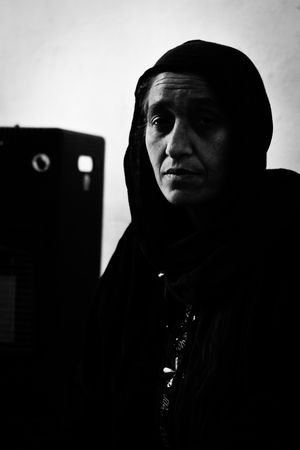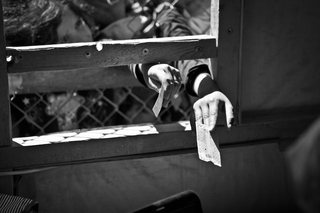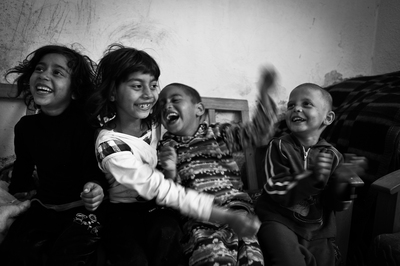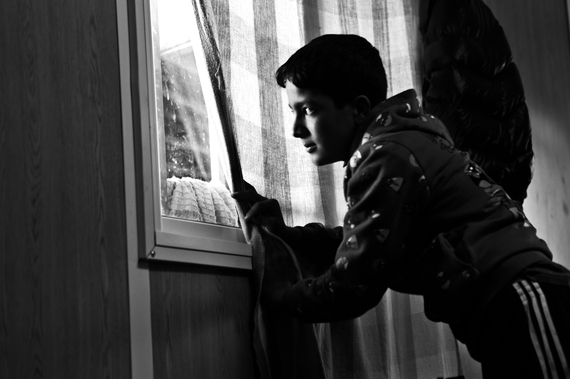By Meg Sattler, Regional Communications Manager, World Vision Syria Crisis Response
"And the course of the Syrian conflict is currently demonstrating the utility of mass atrocities and the relative indifference of the rest of the world." -- Michael Gerson, Washington Post
I started working on the Syrian conflict response last August. I flew from Melbourne and landed into a crisis that I didn't think could get any worse. My previous work in Pakistan had exposed me to conflict, but it wasn't like this. Every family I met in Jordan had a story that shook me to the core. On my first family visit, a young mother, while showing me her kitchen, fell into my arms and wept. I held her there for several minutes feeling helpless. That night, I honestly wondered how long I'd be able to do this.
In September, chemical weapons attacks were proven. Videos of affected children sent shockwaves across the internet and news reports talked about 'red lines'. I met a family in Lebanon who'd just arrived from Ghouta, still feeling sick from the attacks, and unsure how to access healthcare. Foreign intervention was put on the table, and humanitarian agencies here scrambled together to prepare for increased refugee flows. For three days and nights my colleagues and I didn't sleep. Contingency plans were drawn up and journalists were on the phone at all hours, asking what was happening.
Turns out, nothing happened, and we all went back to work as normal.
A new refugee camp was being built in Jordan. Child refugee numbers hit one million. Refugee numbers hit 2 million, then 2.5 million. Child deaths surpassed 10,000, more than the entire population of my hometown. Apparently, things could get worse - a lot worse - and very quickly.  Sometimes people ask me what, to me, is the worst thing about this crisis. I always answer in the same way. But it was only when reflecting on this one day that I realized my nominated 'worst thing' was not really part of the crisis at all.
Sometimes people ask me what, to me, is the worst thing about this crisis. I always answer in the same way. But it was only when reflecting on this one day that I realized my nominated 'worst thing' was not really part of the crisis at all.
'I feel like nobody cares.'
Over Christmas, I was home for nearly two months, in the countryside with my family. My father was starting cancer treatment, so my attention shifted from a certain kind of suffering to another. But still it took me weeks to adjust to the fact that all around me, there was no war. There were no families up the road with horrific stories of death, torture and fear, no children crying for their schools, no rows of beige tents covered in dusty clothing hanging out to dry.
But there were. I knew that there were. I felt like my entire nation was in some kind of snow-dome, with Syrian children all around us, knocking on the glass to get our attention, while we all carried on as though nothing was happening. It wasn't that we couldn't see them. We actively looked away.
Michael Gerson, in his opinion piece on Syria, references both mass atrocities and the relative indifference of the rest of the world. The mass atrocities are clear. They've been felt by everyone here. Peace talks have failed to address them and children, mothers and fathers are struggling to cope with their aftermath.
We regularly write, speak about these atrocities. By their very nature, they demand this, and passionate conversations happen easily. I don't know how to explain the indifference though, particularly to children I meet, smart children, who know full well that their cries are falling on deaf ears.
In Haiti, teenagers used to turn their backs whenever they saw my camera.  Here, kids basically grab it out of my hands. "Please tell the world, in Australia and America, what is happening to us," said one very serious but kind teenage girl I met two weeks ago. "There must be something you and they can do."
Here, kids basically grab it out of my hands. "Please tell the world, in Australia and America, what is happening to us," said one very serious but kind teenage girl I met two weeks ago. "There must be something you and they can do."
I don't really believe that nobody cares. There's nobody I speak to who isn't affected by the stories of these children. And yet the Syrian crisis, labeled the worst humanitarian crisis in the world, is not attracting the commensurate public outcry. World leaders are dismissive, and amid the politics and violence in the media, humanitarian messages are not getting through. A recent poll by World Vision showed that most Americans were not aware of the scale of the crisis, and yet this recent report, written by children -- many of whom I have met -- begs all of us to pay more attention.
This week, the Syrian conflict enters its fourth year. I'll tell myself again that it won't get worse, but I know now that it will. Perhaps the Syrian situation really has reached a level of hopelessness that many of us feel is simply too hard to address.
And yet 5.5 million children affected by this conflict are telling us otherwise. They are hoping to return to the schools, backyards and tree-lined streets of Syria that they miss so much. They dream of being teachers, drivers, doctors. They hope for new toys and for their nightmares to stop.  They hope they'll see their fathers again. They put their hope in their parents, in their host governments, and in the people like us who show up in land cruisers wearing khaki and occasionally hand them something.
They hope they'll see their fathers again. They put their hope in their parents, in their host governments, and in the people like us who show up in land cruisers wearing khaki and occasionally hand them something.
It is this kind of hope that needs to sustain all of us to keep trying. Conflict is a human construct, and wars have ended before. A global effort for peace is not impossible. Perhaps at times it is easier to look away. But it isn't about us; it can't be about us.
A colleague recently shared with me one of her favorite quotes -- where there is breath, there is hope -- in relation to Syria. We must harness the hope of millions of children, and do what we can, and keep asking the world to do more. That is the only choice we have. With a deep breath, I think of all the children I have met, and will continue to meet, and I hope to God that we are not here doing the same thing next year.
